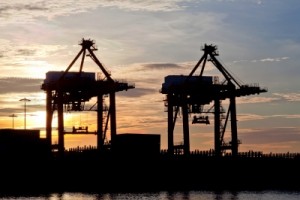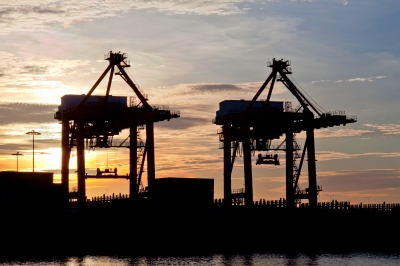 Philippine exporters stand to be the ultimate beneficiaries of the slew of new and upcoming laws as well as regulatory reforms in transportation and shipping, as these policy changes are seen to facilitate the flow of traded goods in the country, according to the Department of Trade and Industry (DTI).
Philippine exporters stand to be the ultimate beneficiaries of the slew of new and upcoming laws as well as regulatory reforms in transportation and shipping, as these policy changes are seen to facilitate the flow of traded goods in the country, according to the Department of Trade and Industry (DTI).
The recently enacted Foreign Ships Co-loading Act (Republic Act No. 10668), and the soon-to-be signed Customs Modernization and Tariff Act (CMTA) are expected to free up the movement of goods and services at the border, and support the forecast of 9% growth in exports in 2016, according to the DTI’s Export Marketing Bureau (EMB).
“High transaction cost of moving trade goods remains to be a major drag factor in the competitiveness of PH exports,” EMB director Senen M. Perlada said in a statement.
“Many of these factors are related to moving and clearing of cargoes at the ports; and cumbersome and costly requirements of regulatory agencies on traded goods. It is thus necessary to remove or at least reduce unnecessary regulatory obstacles to the movement of goods and delivery of services,” Perlada added.
Co-Loading Act benefits
Under R.A. 10668, a foreign vessel arriving from a foreign port is now allowed to carry foreign containers or cargoes to its domestic port of final destination after being cleared at its port of entry. A foreign vessel arriving from a foreign port may also carry foreign containers or cargoes from another foreign vessel calling the same port of entry to the domestic port of final destination of that cargo. These provisions also apply to the loading of export cargoes.
DTI said this law paves the way for the reduction of logistics costs and provide the transshipment services needed by exporters and importers.
The regulation is likewise seen to boost port revenues, and provide price-competitive shipping service so exporters can compete in the international market, DTI noted.
The law will further help decongest Manila ports, as most shipments currently still need to be unloaded in Manila before these are shipped to other domestic ports around the country.
CMTA and other helpful measures
On the other hand, the CMTA amends the outdated Tariff and Customs Code of the Philippines as required under the Revised Kyoto Convention, which is the blueprint for “modern and efficient customs procedures” of the World Customs Organization.
The measure aims to significantly reduce human intervention in the Bureau of Customs’ (BOC) processes and promote transparency and accountability at the BOC.
Already approved at the Bicameral Conference Committee level, the act is now being checked for document formatting , Customs deputy commissioner for Assessment and Operations Atty Agaton Teodoro Uvero told PortCalls. Uvero has been detailed to the Department of Finance to ensure passage of the CMTA.
In a week or so, the measure is expected to be transmitted to the Office of the President for President Benigno Aquino III’s signature. If it is not signed within 30 days from receipt of transmittal, the measure automatically becomes law, said Uvero.
Aside from the CMTA, the BOC has implemented other measures aimed at assisting exporters and importers.
For instance, the trade department said Customs Memorandum Order (CMO) 29-2015 released last September 2015 ordered the discarding of two import forms—the Import Entry and Internal Revenue Declaration (IEIRD) and the Supplemental Declaration on Valuation (SDV)—a policy that will reduce transaction costs in releasing imported items.
The CMO implements the agreement entered into by the Bureau of Internal Revenue, Philippine Statistics Authority, Tariff Commission, and other government agencies on the electronic information interchange among these agencies.
Under CMO 29-2015, the use of IEIRD or BOC Form 236 has been discontinued in favor of the Single Administrative Document (SAD), which now serves as the entry declaration.
The information in the SDV, previously considered a mandatory field in the entry declaration, is now indicated in Box 39 of the SAD. The SAD is secured through BOC’s electronic-to-mobile (e2m) system and printed in two copies.
Another BOC policy welcomed by exporters is the dropping of the requirement to file for a Certificate of Exemption when importing lithium ion batteries, provided these are finished products. This policy is contained in Customs Memorandum Circular No. 96 -2015 pursuant to Dangerous Drugs Board (DDB) Regulation 1-2014.
This reform—implemented following consultations among the Export Development Council, DDB, other government agencies and affected industries—serves to avoid delays in the release of imported lithium ion batteries utilized by the electronics sector.
BOC also revised its port operations manual through CMO 4-2015, thereby abolishing the requirement to file a notice of stuffing, and to have a stuffing inspector present during the stuffing/loading of export cargo containers.
Removing domestic regulations and other unnecessary costs of production and market delivery enhances the capacity of local producers to focus on product improvement and on exploring opportunities given by the government, DTI noted.
“Through these efforts, the export sector is expecting greater participation from the local sector and a positive return in achieving the country’s target growth of 8-9% for exports this year,” DTI said.
Image courtesy of Vichaya Kiatying-Angsulee at FreeDigitalPhotos.net





